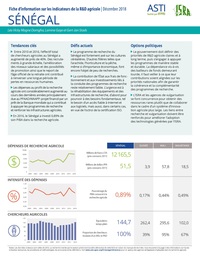Authors:
Léa Vicky Magne Domgho, Lamine Gaye et Gert-Jan Stads
Year:
2018
Publisher
International Food Policy Research Institute and Institut Sénégalais de Recherches Agricoles.
Back to:
Key trends
- Senegal’s total number of agricultural researchers increased by nearly 40 percent during 2010–2016. Large-scale recruitment, improved salary levels, better promotion opportunities, and an increase in the official retirement age managed to reverse a sustained period of capacity losses.
- Agricultural research spending has also risen significantly in Senegal in recent years. The World Bank loan-funded WAAPP, which drove spending on research programs and infrastructure, is the main driver behind this increase.
- In 2016, Senegal invested 0.89 percent of its AgGDP in agricultural research.
Current challenges
- Senegal’s research agenda is heavily focused on cereal crops. Other areas of economic importance, including groundnuts, horticulture, and fisheries remain relatively underresearched.
- Government funding for the operating and capital expenses associated with conducting research programs remains low. Rehabilitation of research equipment and infrastructure is urgently needed, both in terms of basic needs, such as reliable electricity, Internet, and computer software access, but also in terms of achieving ISO certification where appropriate.
Policy options
- The government needs to clearly identify its long-term R&D priorities and secure stable and sustainable funding for R&D programs. Donor dependency remains high. Donor funding needs to be aligned with national priorities to ensure the consistency and complementarity of resulting research programs.
- ISRA and the extension agencies compete for scarce resources rather than collaborating as part of a broader agricultural innovation system. Linkages between research and extension need to be strengthened to ensure that improved varieties and technologies released by ISRA are successfully adopted by farmers.

